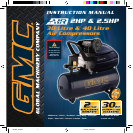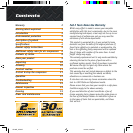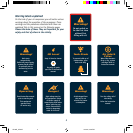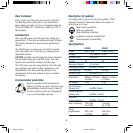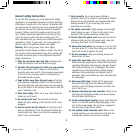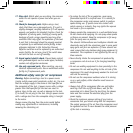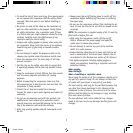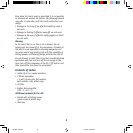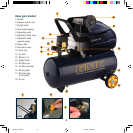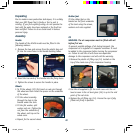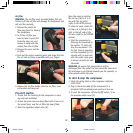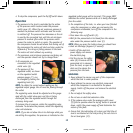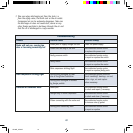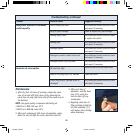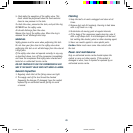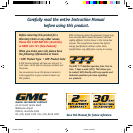
5. Check daily the operation of the safety valve. This
check should be performed when the tank contains
close to max pressure in the tank.
To check the valve, pressurise the tank, and pull the ring
OUTWARDS on the safety valve.
Air should discharge from the valve.
Release the ring of the safety valve. When the ring is
released the air discharge must stop.
WARNINGS.
Safety glasses must be worn when performing this test.
Do not have your face close to the safety valve when
performing this test as air will discharge from the valve at
a high force.
If the safety valve does not operate correctly in any way
as described above, turn off the compressor immediately
and have the compressor and safety valve checked and
tested at an authorised Service centre.
DO NOT CONTINUE TO USE THE COMPRESSOR IN ANY
WAY IF THE SAFETY VALVE DOES NOT WORK AS ABOVE.
General inspection
1. Regularly check that all the fixing screws are tight.
2. The supply cord of the tool should be checked
frequently for damage. If damaged, have the cordset
replaced by an authorised service facility to avoid
a hazard.
Cleaning
1. Keep the tool’s air vents unclogged and clean at all
times.
2. Remove dust and dirt regularly. Cleaning is best done
with a soft brush or a rag.
3. Re-lubricate all moving parts at regular intervals.
4. If the body of the compressor needs cleaning, wipe it
with a soft damp cloth. A mild detergent can be used
but nothing like alcohol, petrol or other cleaning agent.
5. Never use caustic agents to clean plastic parts.
Caution. Water must never come into contact with
the tool
Power cord maintenance
Only an authorised service centre should replace the
cordset or carry out other repairs. If the cordset is
damaged or worn, have it repaired or replaced by an
authorised service centre.
15
AC30G_AC40G 12/8/05, 4:49 PM15



